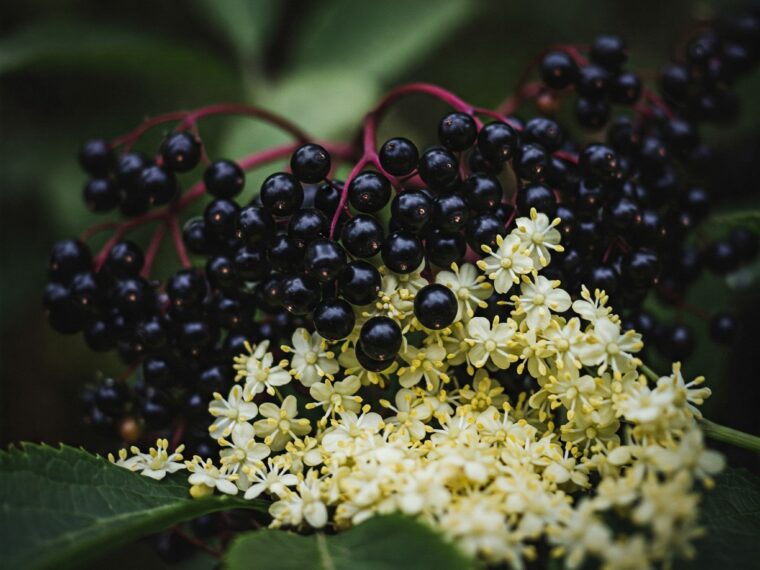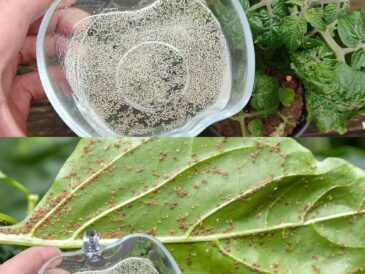Elderberries and their delicate flowers have long been treasured in traditional medicine and folk remedies for their powerful health benefits. Derived from the Sambucus plant—most commonly Sambucus nigra (European elder)—these natural treasures offer a unique blend of nutrients, antioxidants, and healing properties. While the berries and flowers are edible when properly prepared, the rest of the plant (including raw berries and stems) can be toxic and should be avoided. Below is a detailed look at the powerful benefits of elderberry flowers and berries.
1. Rich in Antioxidants and Immune Boosters
Elderberries are packed with anthocyanins, the dark pigments that give them their deep purple color. These compounds have strong antioxidant properties that help protect the body from oxidative stress, which contributes to aging and chronic diseases.
- A study published in the Journal of Functional Foods (2016) found that elderberry extract significantly reduced the duration and severity of colds in air travelers.
- Elderberry flowers also contain flavonoids like quercetin and rutin, which support immune function and reduce inflammation.
2. Supports the Immune System
Elderberry berries and flowers are often used to ward off flu and cold symptoms.
- In a randomized study (Nutrients, 2019), elderberry supplementation was shown to reduce cold duration and symptoms in participants by an average of two days compared to a placebo.
- The flowers have mild antiviral properties and can be used in teas and infusions to boost immune defense during cold and flu season.
3. Anti-Inflammatory and Pain-Relieving Properties
Both elderberry and elderflower have anti-inflammatory effects. These properties make them beneficial for easing muscle pain, sinus pressure, and headaches.
- The flavonoids and phenolic acids present in the flowers and berries reduce inflammation in the body by suppressing pro-inflammatory cytokines.
- Elderflower tea is often used to reduce joint inflammation and relieve arthritis-related symptoms.
4. Promotes Healthy Skin
Elderflower is a common ingredient in natural skin care products because of its antioxidant, antibacterial, and anti-inflammatory benefits.
- Elderflower water can help tone and tighten the skin, reducing the appearance of pores.
- The flowers are known to promote clearer skin by combating acne-causing bacteria and calming irritated skin.
5. Digestive Support and Detoxification
Traditionally, elderberry and elderflower infusions were used as natural laxatives and detoxifiers.
- Elderberry juice and syrup promote bowel regularity and help eliminate toxins from the body.
- Elderflower tea has a gentle diuretic effect, supporting kidney function and encouraging the elimination of waste.
6. Heart Health Benefits
Elderberries may also support cardiovascular health by improving blood pressure and cholesterol levels.
- A study in Phytotherapy Research (2015) found that elderberry extract helped reduce LDL (bad) cholesterol and improved blood vessel function.
- The potassium content in elderberries can aid in regulating blood pressure and supporting overall heart function.
7. Natural Allergy Relief
Elderflowers, in particular, are known for their antihistamine-like properties. They are traditionally used to treat seasonal allergies and hay fever.
- Drinking elderflower tea may help reduce sneezing, congestion, and watery eyes during allergy season.
- The anti-inflammatory compounds help calm the body’s immune response to allergens.
8. Respiratory Relief
Both the berries and flowers of elderberry plants have expectorant properties, making them ideal for relieving coughs, bronchitis, and sinus infections.
- Elderflower tea and steam inhalation are natural remedies for clearing nasal passages and easing breathing difficulties.
- Elderberry syrup is often taken for chest colds and congestion.
How to Use Elderberries and Elderflowers
TO CONTINUE READING THE ARTICLE PLEASE SEE PAGE 2




